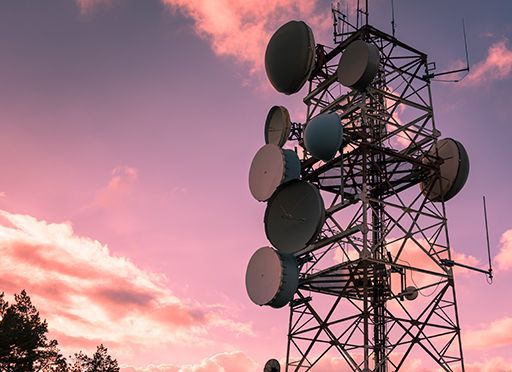As Journalism Frays, So Do Democracies
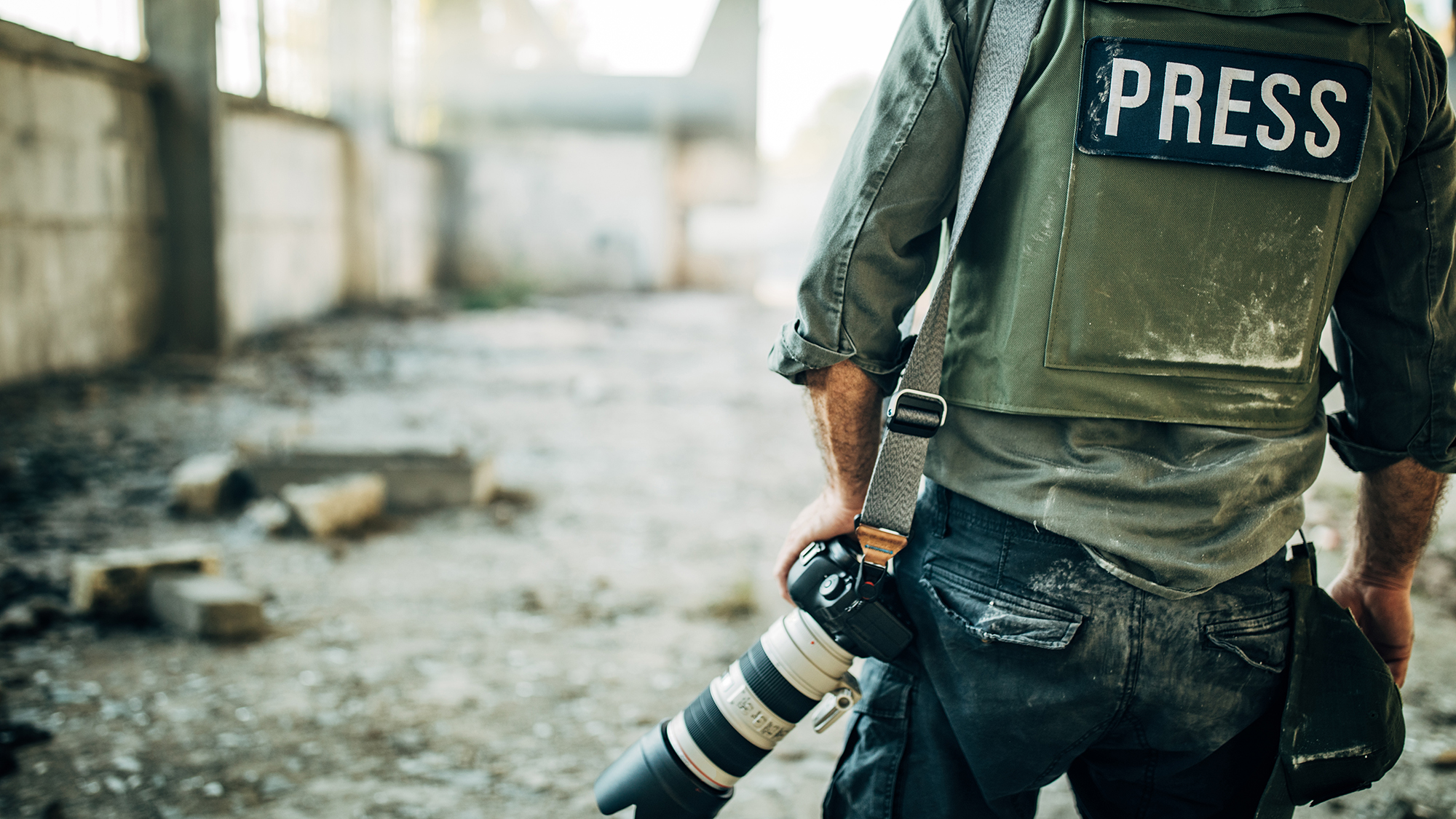
In the summer of 2020, after enacting a vaguely worded national security law, the Chinese government shut down Apple Daily, Hong Kong’s largest pro-democracy news outlet, and arrested its founder Jimmy Lai and several staff. Government officials also imposed limitations on public news outlet RTHK, forcing the replacement of its director with a bureaucrat who favors anti-democratic programming, writes New York Times editor Jennifer Jett in “How Press Freedom Is Being Eroded in Hong Kong.” This is just one of many salvos currently threatening the free press internationally. Reporters Without Borders reports while the number of journalist deaths declined to 46 in 2021, an unprecedented number of journalists are currently imprisoned arbitrarily – 488, 60 of them women, an increase of 20% over last year – and an additional 65 are held hostage. This year, the Nobel Prize for Peace went to Maria Ressa and Dmitry Muratov, independent journalists from the Philippines and Russia, respectively. By awarding them, the Foundation emphasized the essential relationship between a free, independent press and robust democracy.
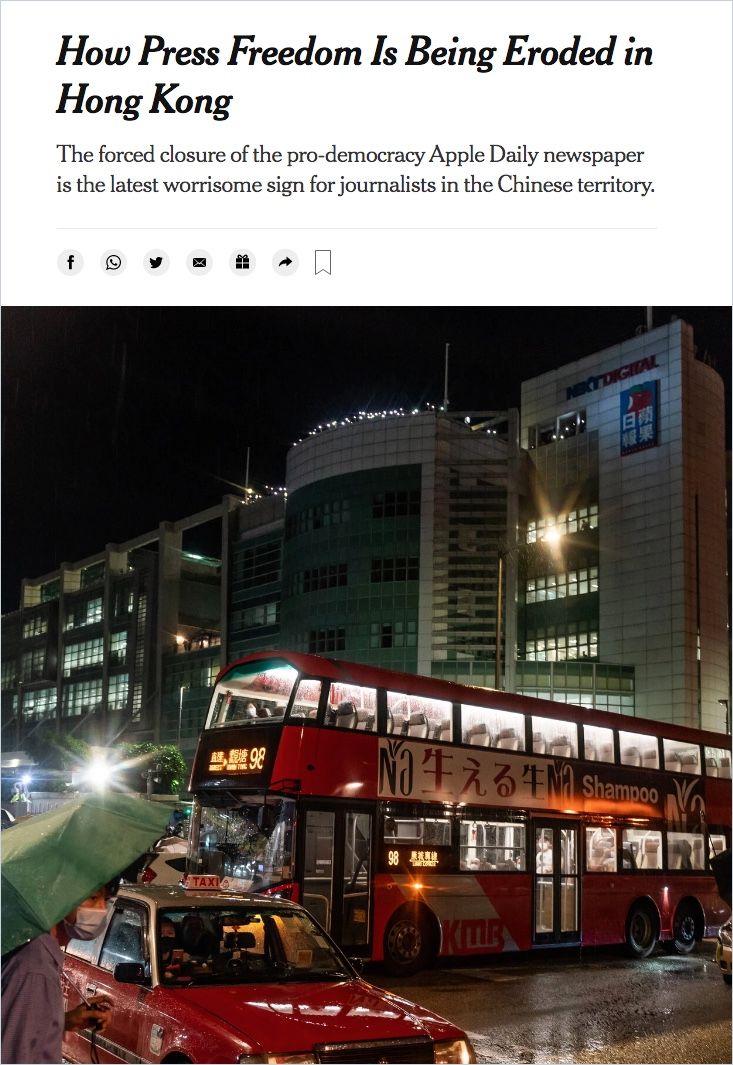
Yet public trust in the media is at an all-time low. Newspapers with traditionally good reputations for solid journalism have lost revenues and subscribers for decades. Between 2008 and 2018, the news-gathering workforce decreased by half. As journalism shifted from chasing the truth to chasing clicks, democracy, which relies so heavily on a free press US founders enshrined it in the First Amendment of the Constitution, has suffered.
Columbia professor Samuel G. Freedman still has faith in the transformative power of the press. Freedman wrote in Letters to a Young Journalist that journalism is a moral calling, like the priesthood. Journalism needs professionals willing to keep an open mind as they ask questions, gather facts and report their findings in a fair-minded, ethical way. Subjectivity is part of human nature and fairness is not the same as objectivity. Too often journalists use “objectivity” to mask lazy thinking, writing “he said, she said” stories that provide no context or stakes for the reader. Carried too far, the search for “balance” strips news of meaning, and can be dangerous. As 200 historians wrote to C-SPAN, voicing objection to its insistence on broadcasting a Holocaust denier to “balance” a lecture given by a Holocaust scholar, “Falsehoods cannot ‘balance’ the truth.”
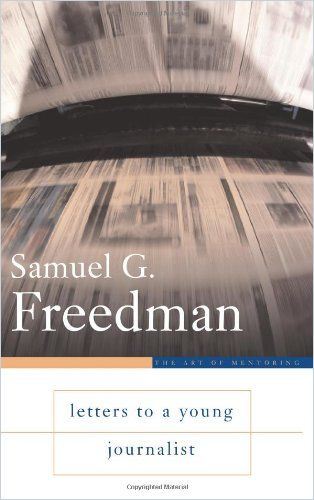
Real morality comes from empathy even while news-gathering. Photographer Nick Ut took the Pulitzer Prize–winning picture of a distraught Vietnamese girl running in the street after a napalm attack during the Vietnam War. The photo is well-known; less well-known is that, after taking it, Ut rushed the girl to a hospital, which saved her life. At the same time, reporters must resist feeling a sense of loyalty to the candidate, team or military unit they cover. Don’t forget your humanity, but “your first loyalty is to the truth.” By including nuance, but being clear-eyed in reporting, journalists can help build back the public’s trust.
Being adversarial sounds righteous except when it is a mere reflex, just one more way of imposing black-or-white absolutism on a world washed in grays.
Samuel G. Freedman
There is no shortage of critique for the US media, as a 2015 survey of journalists illustrates in “The Case Against the Media by the Media.” According to them, the media seeks to entertain instead of inform and does not reflect the diversity of their communities. Reporters oversimplify complicated issues, are biased for negative news and report gaffes as if they are newsworthy. They can be cruel and sexist. One often overlooked criticism is that the media rarely reports on the issues both political parties agree on. Too often journalists pander to their perceived audience rather than accurately and thoroughly conveying the news.
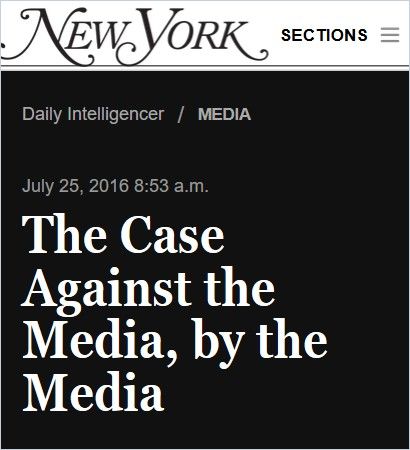
Journalists focus on the mistakes of powerful individuals but ignore larger social institutions. In The News, author Alain de Botton urges reporters to write more engagingly to overcome reader indifference. By describing the context, what normal looks like in other places, readers might care more about when those lives are disrupted by violence or disaster.
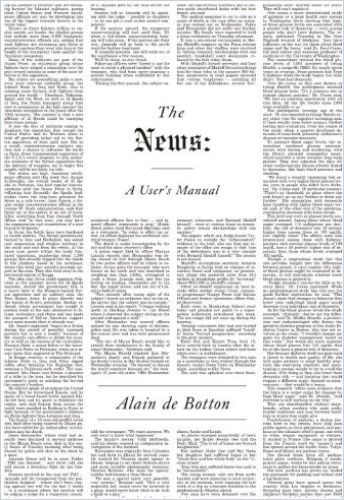
Beyond reporting economic numbers, journalists can tell readers about companies and how they operate. It’s not outside the scope of journalism to relate financial stories to their impacts on people. However, when the BBC gets 5.82 million views on a story about the Duchess of Cambridge’s pregnancy compared to under 2,000 on how peace talks failed in Congo, you can be sure which kind of “news” the organization will focus on.
What should be laudable in a news organization is not a simple capacity to collect facts, but a skill…at teasing out their relevance.
Alain de Botton
As Robert W. McChesney writes in Digital Disconnect, the rise in cable and internet outlets splintered the news landscape and ad dollars flowed to fewer companies, causing newspapers across the country to close. The vision of an open internet as a “force for freedom” that censors would be unable to restrain soon gave way to monetization and consolidation in the media sector.
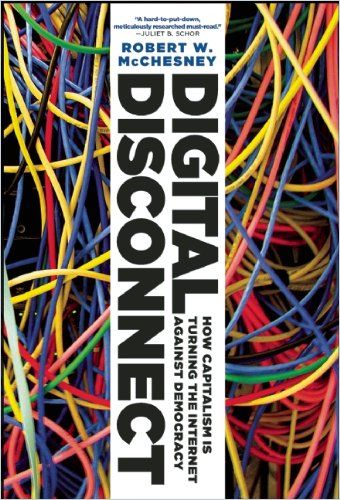
A handful of tech companies gained influence with the popularity of social media, and decreased the value of the news to nearly free. The bulk of ad dollars now flow to Facebook and Google while news is often free, but the cost is user privacy.
The corporate media sector has spent much of the past 15 years doing everything in its immense power to limit the openness and egalitarianism of the internet.
Robert W. McChesney
Media expert Anya Schiffrin elaborates on the current state of Media Capture, blaming advertising and social media for essentially destroying independent blogging. Bloggers changed their focus from quality to quantity and to building view counts to appeal to advertisers.
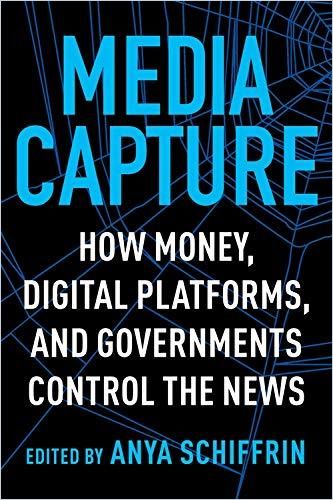
Now advertisers have enormous power to shape the news. Talking Points Memo relies upon Google ads and their apps to let advertisers buy space on their site. They realized how vulnerable that made them when Google warned they might terminate their agreement over “hate speech” on some of their pages. But the articles in question were reporting on white supremacists, not hate speech. India has a variety of news outlets, but the government controls ad revenues. Under Prime Minister Narenda Modi, government officials routinely demand specific coverage from editors and owners. In 2018, 33 Indian journalists were arrested and seven died covering the news. In the past decade, organizations like the Organized Crime and Corruption Reporting Project were founded to foster independent international as well as regional investigative reporting.
Digital economics aren’t going to support the kind of robust, reporting-heavy journalism we need, particularly at the regional and local level. Period.
Anya Schiffrin
Over the course of its transformation to digital, The Washington Post almost closed. Circulation plummeted along with ad revenues; previously 40% of its income came from classified ads, but that money fled online to sites like Craigslist. At the same time, major outlets took credibility hits over plagiarism, phone-hacking scandals and their willfully naive coverage of the ramp up to the Iraq War. Meanwhile, Rush Limbaugh and other right-wing pundits relentlessly criticized mainstream outlets for their “liberal bias,” a talking point author Eric Alterman debunks in What Liberal Media?
In Merchants of Truth, author Jill Abramson lays out this era of change and focuses on a company that harnessed the new online dynamics to become a media juggernaut. BuzzFeed CEO Jonah Peretti saw the writing on the wall and devised “contagious media” that took advantage of the way social media algorithms work. He emphasized “sharability” above all else. He also implemented “native advertising,” which was shareable sponsored content mixed in with the news, destroying the traditional wall between editorial content and advertising.
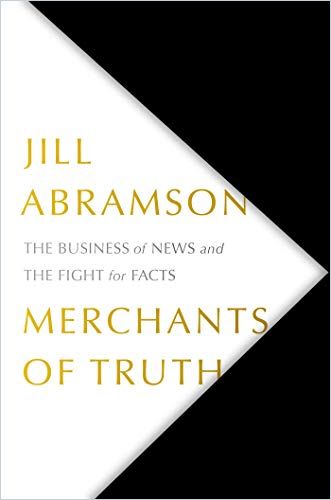
While, in 2014, most people considered the outlet unreliable, to its credit, BuzzFeed added news divisions as it grew, including an investigative unit that won a 2021 Pulitzer Prize for its reporting on the Xinjiang internment camps. Meanwhile, traditional outlets added in-house ad agencies, adopted BuzzFeed-style “clickbaity” headlines and many journalists write with social media algorithms in mind, even if just subconsciously. A good reputation still matters; trusted outlets still set the agenda for public discourse, even smaller outlets.
Gaming social media algorithms is also exploited by purveyors of “fake news,” as Guardian editor Katharine Viner describes in “How Technology Disrupted the Truth.” Brexit Party leader Nigel Farage used slick documentary-style production values to send a message to his millions of followers that the French Navy helped immigrants illegally enter the UK. It was pure propaganda, writes Helen Lewis in “The Mainstream Media Won’t Tell You This.”
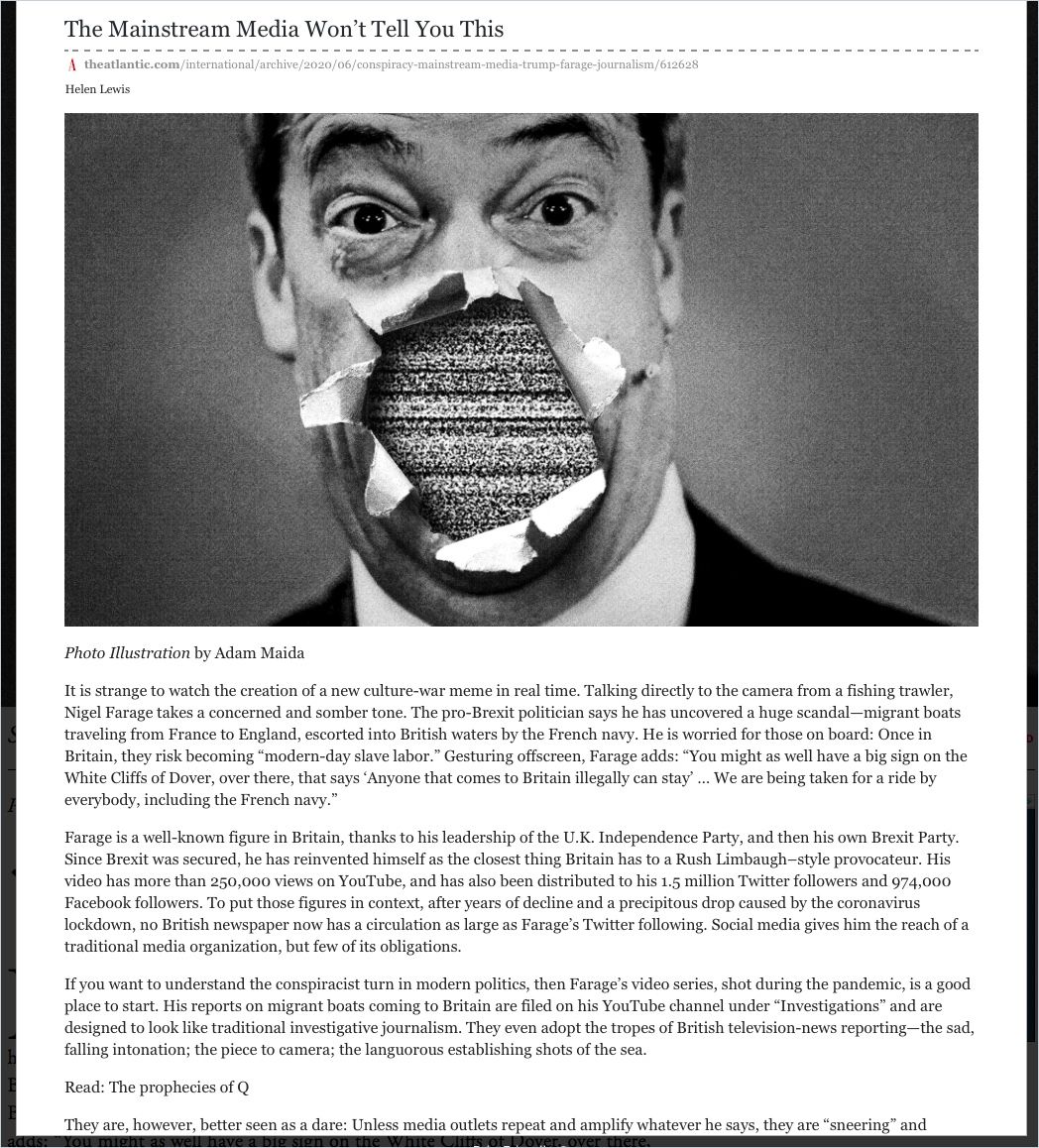
The purpose wasn’t to convince anyone it was true; the purpose was to create distrust and doubt. When mainstream outlets ignore these manufactured lies, propagandists then make the story about how the media is repressing information.
These stories are not designed to lead to an outcome – an inquiry, a conviction, a change in policy. They exist to seed the internet with culture war talking points. We live in a world of hollow facades.
Helen Lewis
Media ownership by oligarchs doesn’t get the same press open political corruption does, but it’s a worrying trend for the free press writes journalist Jon Allsop in “A Helicopter Crash in Alaska Reverberates Through Europe’s Media.” Oligarchs around the world with strong loyalties to their governments are buying up major media outlets.
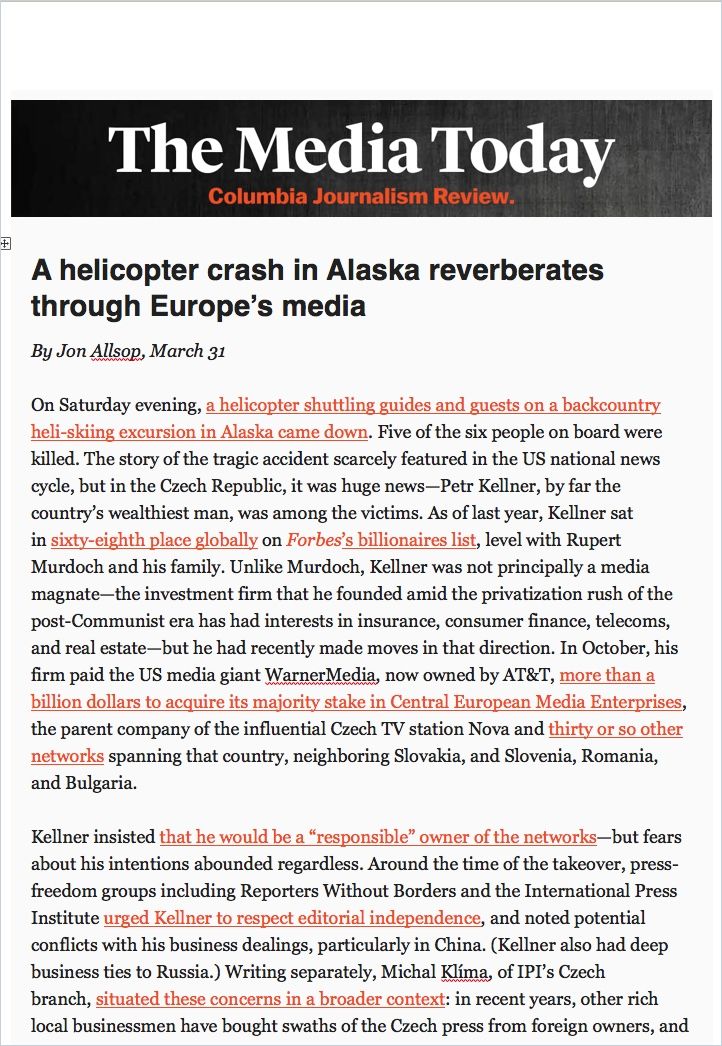
A helicopter crash in Alaska reverberates through Europe’s media
Columbia Journalism ReviewSupporters of Hungary’s strongman leader Viktor Orban bought an influential news site then fired its independent editor. Other staff resigned. A Hungarian governmental agency forced the shutdown of an independent radio broadcaster; Hungarian courts supported the move. In some places, the public is doing what it can to defend independent outlets. Italy, Poland and Romania have a “one-percent law” whereby taxpayers can choose which outlets receive a portion of their taxes. Google announced plans to fund three news outlets in partnership with the McClatchy media company, but it remains to be seen how independent such ventures can be.
For the news to survive in the digital age, and perform its vital function for democracy, outlets will need to experiment with and fund the models that work for them. Paywalls, greater philanthropic funding such as the John S. and James L. Knight Foundation or the Sandler family that supports investigative journalism at ProPublica, ad-supported venues and even sponsored outlets like Quartz, a business news outlet of the Atlantic funded by Chevron, Boeing, Cadillac and Credit Suisse all have their place, so long as they maintain transparency and are part of a diversely populated media landscape. Another possibility is public subsidy, like a one-percent law or larger budgets for public broadcasting.
Journalism that exposes what is being kept hidden or secret is so central, so essential, to a democratic government that its importance is fundamental to the new journalism as well as the old.
Bill Kovach and Tim Rosenstiel
In democracies with a thriving free press, citizens must now act as their own gatekeepers for the news, curating what information they get through social feeds, subscriptions or emails. Authors Bill Kovach and Tim Rosenstiel note in Blur looking at the news with a dash of skepticism is a healthy habit for discerning rigorous reporting.
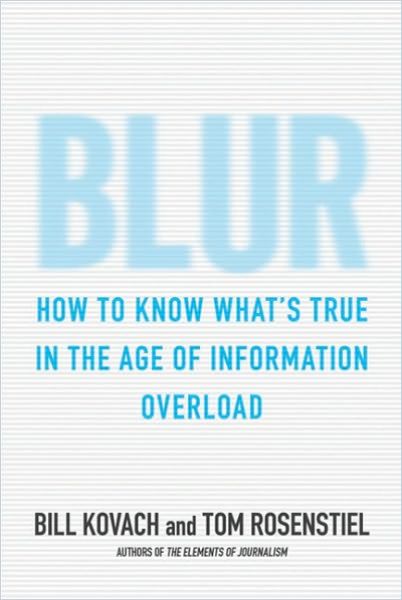
They offer these pointers to keep in mind:
- “Classify the content” – is it “journalism, propaganda, advertising, publicity, entertainment or raw information?”
- Assess how comprehensive the story is.
- Assess the source or sources – give greater variety or eyewitness accounts greater weight.
- Look at the evidence presented.
- Analyze the explanation.
- Assess the story’s relevance.
Find out more about how digital transformation is reshaping media:
